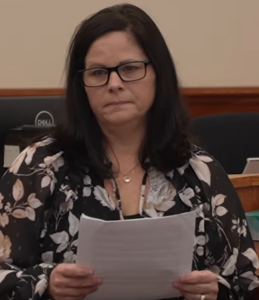Rhonda Jewell is a kind and decent person who, in July 2023, had a devastating memory lapse—she forgot a beloved child in a parked vehicle. It is a heart-wrenching mistake that thousands of loving parents and caregivers have made, and one that will torture her for the rest of her life. But this unimaginably tragic accident was just that: an accident. It was not a crime, much less murder. The MacArthur Justice Center is fighting to overturn Ms. Jewell’s unjust felony-murder conviction and draconian seventeen-year prison sentence.

On a sweltering summer day in 2023, Rhonda Jewell—a 46-year-old mother of three and a highly-regarded caregiver in her small rural Florida community—was driving to a home to care for multiple children when the unthinkable happened. In her rush to arrive on time, Ms. Jewell lost awareness that a beloved child—the precious ten-month-old granddaughter of her best friend, whom she was also scheduled to watch that day—was quietly sleeping in a rear-facing car seat behind her. She went inside and began engaging with the other kids as she always did, having forgotten that the baby was still in the car. It was not until the child’s mother arrived five hours later that Ms. Jewell realized her devastating mistake. Ms. Jewell sprinted to the car in a panic and pulled the baby’s lifeless body out, holding the baby close and praying that God would take herself instead of the child. But it was too late: in the brutal Florida heat, the car’s interior had reached fatal temperatures hours before.
The haunting scene that played out that day—forever changing two families’ lives in an instant—has become alarmingly familiar since the early 1990s, when the advent of airbags meant moving children to the backseat, out of view. Indeed, while vehicular heatstroke deaths were relatively uncommon before 1990, over 1,100 children have perished in hot cars nationwide since then, averaging 38 per year. In the vast majority of incidents, the child was left unintentionally and unknowingly by a loving and devoted parent or caregiver, who simply forgot—due to multitasking, stress, a change in routine, or a combination of factors—that the child was in the car. These sorts of “prospective memory failures” are a well-documented neuroscientific phenomenon that we all experience on a daily basis—we forget to do something we planned to do because we were on autopilot and got distracted. In essence, our habit-brain memory system takes over and overwhelms its prospective memory function.
“Hot car tragedies are every parent’s worst nightmare. And they don’t happen because someone didn’t love their child enough. They happen because we’re human—and even the strongest love can’t compete with the limits of human memory.”
–Janette Fennell, President and Founder, Kids and Car Safety, Inc.
For most of us, these memory lapses have trivial consequences—forgetting to stop at the store, forgetting to return someone’s call, forgetting why we walked into a room. But for those unfortunate souls who experience a lapse while driving with a sleeping child in the backseat, the consequences can be catastrophic and life-shattering. The problem of unintentional hot car deaths is significant enough that—after decades of lobbying by vehicular heatstroke prevention groups—Congress enacted legislation in 2021 mandating that all new automobiles be equipped with technology to alert the operator to check the backseat for a child after the motor is deactivated.
In Ms. Jewell’s case, the evidence showed overwhelmingly that her mistake in leaving the child, whom she loved as one of her own, was entirely accidental—the product of a tragic memory lapse, not a knowing or conscious act. And, indeed, a Florida jury acquitted her of all crimes involving “culpable negligence” precisely because the State presented no evidence that her fatal error was conscious.
How, then, is she facing seventeen years’ incarceration? Because the State of Florida also charged her with murder under the “felony murder” doctrine, a legal principle that deems unintentional deaths that occur during the commission of a felony to be murder. While the felony murder rule originated as a way to punish and deter foreseeable deaths caused by people who intentionally undertake inherently dangerous felonies, some states have distorted it to cruel extremes, capitalizing on its diluted burden of proof to transform accidental or innocent conduct into murder.
Ms. Jewell’s case exemplifies these extremes. Her tragic memory lapse was plainly not murder under any reasonable definition of the word. And the only way the State of Florida could deem it so was by charging her with “felony murder” based on an underlying felony—“leaving a child unattended in a motor vehicle”—that the trial court ruled did not require any proof of knowledge. In other words, Ms. Jewell was convicted of murder—and sentenced to seventeen years in prison—for something she did not even know she had done, much less intend to happen. The MacArthur Justice Center, alongside our partners at the Southern Poverty Law Center, have taken up Ms. Jewell’s case on appeal to correct this erroneous and unjust application of the felony murder doctrine and ensure that good and decent people like Ms. Jewell not be branded as murderers for tragic but unintentional accidents.
Florida’s First District Court of Appeal
For media inquires please contact:
(NOTE: This mailbox is for media inquiries only. All other inquiries, including legal and representation questions, should be submitted through our Contact Form.)
